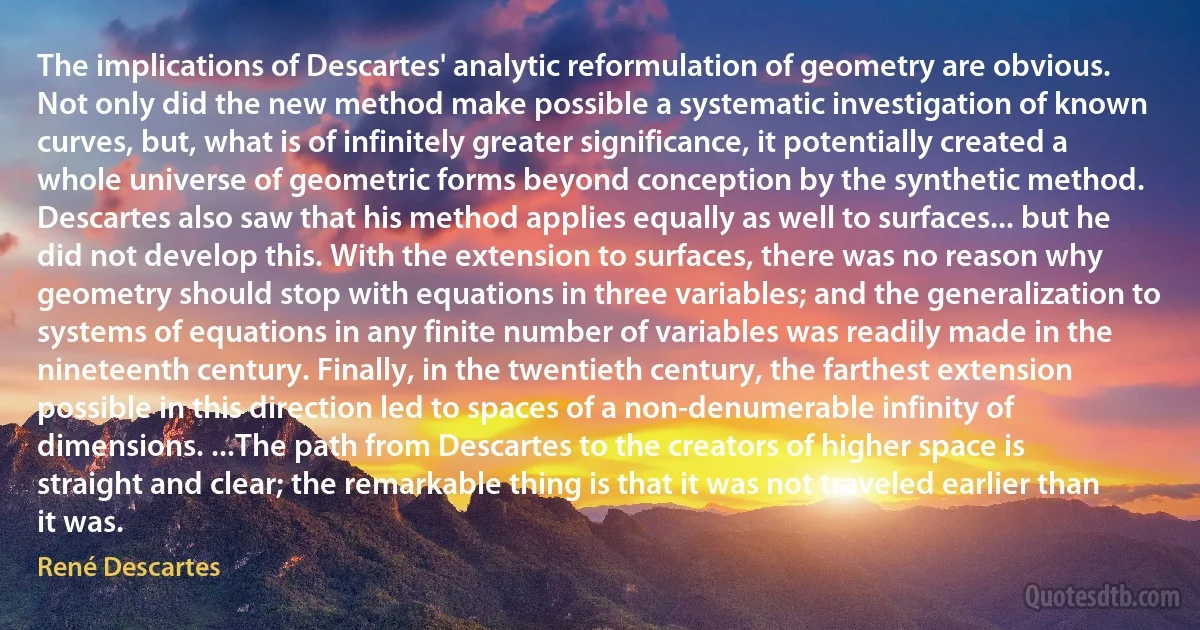
The implications of Descartes' analytic reformulation of geometry are obvious. Not only did the new method make possible a systematic investigation of known curves, but, what is of infinitely greater significance, it potentially created a whole universe of geometric forms beyond conception by the synthetic method. Descartes also saw that his method applies equally as well to surfaces... but he did not develop this. With the extension to surfaces, there was no reason why geometry should stop with equations in three variables; and the generalization to systems of equations in any finite number of variables was readily made in the nineteenth century. Finally, in the twentieth century, the farthest extension possible in this direction led to spaces of a non-denumerable infinity of dimensions. ...The path from Descartes to the creators of higher space is straight and clear; the remarkable thing is that it was not traveled earlier than it was.
René DescartesRelated topics
beyond century clear conception direction early extension generalization geometry infinity known led nineteenth number path possible reason saw should significance space stop straight synthetic thing three well higher DescartesRelated quotes
It delights me even more, though, to hear that my nameless cosmic monsters have an air of originality about them! Shapeless, unheard-of creatures are not original with me; for although Poe did not use them, they figure quite widely in minor horror-writing since his time. Usually they tend to be exaggerations of certain known life-forms such as insects, poisonous plants, protozoa, & the like, although a few writers break away wholly from terrestrial analogy & depict things as abstractly cosmic as luminous protoplasmic globes. If I have gone beyond these, it is only subtly & atmospherically-in details, & in occasional imputations of geometrical, biological, & physico-chemical properties definitely outside the realm of matter as understood by us. Most of my monsters fail altogether to satisfy my sense of the cosmic-the abnormally chromatic entity in The Colour Out of Space being the only one of the lot which I take any pride in.

H. P. Lovecraft
A great chapter of the history of the world is written in the chalk. Few passages in the history of man can be supported by such an overwhelming mass of direct and indirect evidence as that which testifies to the truth of the fragment of the history of the globe, which I hope to enable you to read, with your own eyes, tonight.
Let me add, that few chapters of human history have a more profound significance for ourselves. I weigh my words well when I assert, that the man who should know the true history of the bit of chalk which every carpenter carries about in his breeches-pocket, though ignorant of all other history, is likely, if he will think his knowledge out to its ultimate results, to have a truer, and therefore a better, conception of this wonderful universe, and of man's relation to it, than the most learned student who is deep-read in the records of humanity and ignorant of those of Nature.

Thomas Henry Huxley
I am not superstitious, but the first time I saw this medal, bearing the venerated likeness of John Calvin, I kissed it, imagining that no one saw the action. I was very greatly surprised when I received this magnificent present, which shall be passed round for your inspection. On the one side is John Calvin with his visage worn by disease and deep thought, and on the other side is a verse fully applicable to him: ‘He endured, as seeing Him who is invisible.'
This sentence truly describes the character of that glorious man of God. Among all those who have been born of women, there has not risen a greater than John Calvin; no age, before him ever produced his equal, and no age afterwards has seen his rival. In theology, he stands alone, shining like a bright fixed star, while other leaders and teachers can only circle round him, at a great distance - as comets go streaming through space - with nothing like his glory or his permanence.

Charles Spurgeon
At the beginning of the 1980s the world community faces much greater dangers than at any time since the Second World War. It is clear that the world economy is now functioning so badly that it damages both the immediate and longer-run interests of all nations...The problems of poverty and hunger are becoming more serious; there are already 800 million absolute poor and their numbers are rising; shortages of grain and other foods are increasing the prospect of hunger and starvation...Between 20 and 25 million children below the age of five die every year in developing countries...A number of poor countries are threatened with the irreversible destruction of their ecological systems while many more face growing food deficits and possibly mass starvation. In the international economy there is the possibility of... a collapse of credit with defaults by major debtors, or bank failures... [and] an intensified struggle for influence or control over resources leading to military conflicts.

Willy Brandt
The eighteenth century called upon man to free himself of all the historical bonds in the state and in religion, in morals and in economics. Man's nature, originally good and common to all, should develop unhampered. In addition to more liberty, the nineteenth century demanded the functional specialization of man and his work; this specialization makes one individual incomparable to another, and each of them indispensable to the highest possible extent. However, this specialization makes each man the more directly dependent upon the supplementary activities of all others. Nietzsche sees the full development of the individual conditioned by the most ruthless struggle of individuals; socialism believes in the suppression of all competition for the same reason. Be that as it may, in all these positions the same basic motive is at work: the person resists to being leveled down and worn out by a social technological mechanism.

Georg Simmel
